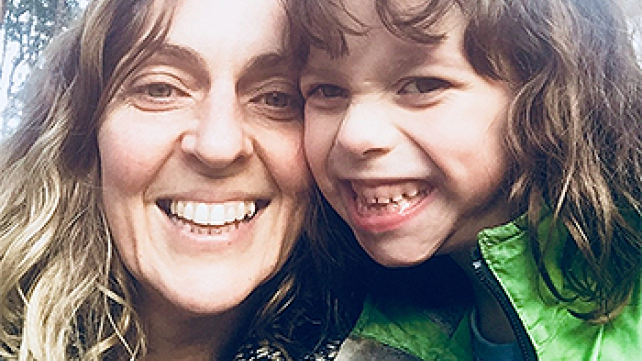
Communication can appear to be different for certain individuals, and, as in the case of other creations of Allah, it is not always evident through speech. Allah's way of communicating with His chosen people was through Wahees - dreams which give clear indications. Similarly, through understanding of the Quran and Sunnah, the ways of our beloved Prophet Muhammad, peace and blessings be upon him, we know that humans can communicate directly with Allah through Duaa.
Allah mentions in the Quran how he taught man to communicate his needs, through different modes of expression. It is apparent that humans, also referred to as the noblest of creations, cannot function without being able to communicate in a meaningful way, as all other functions of our lives are dependent upon this skill, for survival.
When Speech Is Difficult
Communication is not always easy, even with a common language. For very young children and children with special needs, effective communication can be very challenging and even seem impossible. This is where the use of Makaton can be a life changer!
Makaton helps by bridging the gaps between meaningful communication through the use of signs, symbols, and speech. It takes away that frustration and empowers individuals to connect with others and the world around them. Although Makaton is yet to gain popularity world-wide, it has shown great success in terms of empowering individuals through building their communication skills, in the UK specifically, where it originated.
Unlike sign language, Makaton uses signs in conjunction with speech, in spoken word order. This helps to provide extra clues, particularly for those who have limited speech as well as those who cannot, or prefer not to use signs when communicating. The use of signs and symbols together can help individuals who have no speech or whose speech is unclear. They provide a visual representation of language which increases understanding and makes expressive communication easier.
Makaton not only aids communication, but also supports the development of other requisite communication skills such as listening and attention, comprehension, memory and recall, and the organization of language and expression as a whole.
The only potential challenge with sign language is its sensitivity towards different cultures. Makaton, however, takes cultural sensitivity into account and tailors it to suit the needs of different cultures around the world. This is what makes it extra special and noteworthy.
What is Makaton?
The complete Makaton Language Programme is comprised of two vocabulary structures:
- A Core Vocabulary of essential words or concepts presented in stages of increasing complexity. This forms the foundation of the programme and typically includes basic signs and symbols associated with everyday communication needs, such as common food items, actions, and expressions.
- A more extensive, open-ended, topic-based resource vocabulary providing an expansive set of further signs and symbols covering broader life experiences. These are used in coalition with the Core Vocabulary, as required.
This multi-modal approach - where one mode facilitates another - has evidently shown to increase opportunities for personal expression and development. It has proven to improve participation in social interaction and greatly helped individuals to gain access to education, training, and public information.
Makaton is extremely flexible in the sense that it can be personalised to an individual's needs and tailored to a level suitable for them, somewhat similar to an IEP (Individual Education Plan).
Today over 100,000 children and adults use Makaton symbols and signs. Most commonly, people start using Makaton as children, until eventually they naturally stop using the signs and symbols as they no longer need them. There are some individuals who require it on a continued basis, however.
Who can benefit from it?
The Makaton language programme is beneficial for children and adults of all ages and abilities. The most Common users of Makaton include:
People with learning and/or communication difficulties.
Makaton is popularly being used in the UK by adults and children with learning or communication difficulties. It may as well be used by people who share lives with such individuals, for example, parents and other family members, friends and caretakers, and education and health professionals.
People developing their language and literacy skills.
Makaton is helpful for teaching children and adults who are at an early stage of communication, language, and literacy development. It's structured approach can also be beneficial to learners who are learning English as an additional language, as it can assist them with gaining wider access to vocabulary and using it in appropriate situations.
Mainstream schools.
Makaton is beginning to be routinely used in some mainstream schools around the world. The greatest advantage this brings is that it helps support integration, as it enables children with and without language difficulties to communicate, learn, and play together more easily.
People looking after babies and young children.
The use of Makaton in the early years can develop and strengthen bonds between the caretaker and child by increased understanding of a baby's wants and needs. Also, it can help facilitate the process of communication which can reduce frustration. Parents, family members or professionals who wish to sign with the babies and children in their care can also take Special Makaton Signing for Babies training.
No matter the severity of the need or which part of the world we’re in, the need to bridge these communication gaps is absolutely essential. We are now living in an age where we are advancing at an amazingly rapid rate. For some of us, this has caused an increased amount of stress and frustration, which needs the right amount of attention and devotion. If you are interested in gathering more details about Makaton and its availability in your region, please check out their website at https://www.makaton.org/.
Umm Ahmed is a Makaton Level 1 certified Early Childhood Educator and writer who is passionate about seeking knowledge and passing it onto others. She and her husband are parents to three boys and are currently living in Abu Dhabi.



Add new comment